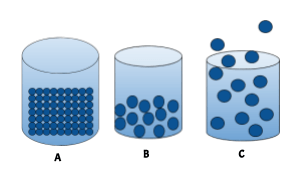Solubility ask "_____?"
A. Will it conduct electricity?
B. Will it float in water?
C. Will it dissolve in water?
D. Can it be separated?
C. Will it dissolve in water?
True or False: Light travels in a straight line?
True
What are sediments?
Sediments are small parts of rock
__________ resources can be replaced in our lifetime.
A. Natural
B. Renewable
C. Non-renewable
D. Fossil Fuel
B. Renewable
How long does it take earth to complete one revolution?
365 Days
______ is the long term weather patterns in a specific area.
Climate
 Image C represents the physical state of _____.
Image C represents the physical state of _____.
A. Gas
B. Plasma
C. Liquid
D. Solid
A. Gas
_____ allow electricity to flow easily.
A. Insulators
B. Magnetism
C. Electrical Energy
D. Conductors
D. Conductors
_____ breaks it, _____ takes it, _____ drops it.
weathering breaks it, erosion takes it, deposition drops it.
What three things are needed to create fossil fuels?
Pressure, Organic Matter, and lots of time!
The sixth planet from the sun is?
A. Uranus
B. Saturn
C. Mars
D. Venus
B. Saturn
What causes shadows?
Earth's rotation causing the sun to appear to move.
Which change occurs when lemon juice is mixed with water?
A. The mass of the lemon juice decreases.
B. The water becomes a solid.
C. The lemon juice dissolves and spreads out evenly in the water.
D. The volume of the water decreases.
C. The lemon juice dissolves and spreads out evenly in the water.
True or False: Parallel circuits have only two paths.
False
What causes a V-shaped valley?
A. Water
B. Wind
C. Glacier
D. None of the above
Water
Which of the following is a non-renewable resource; petroleum, wind, plants, or animals
Petroleum
Which planet has the longest orbit?
Neptune
Which of the following explains how water undergoes a change of state in one stage of the water cycle in order to move from the ocean’s surface into the air?
A. Liquid water that is heated by the sun becomes a gas and rises.
B. Gaseous water rises as it is cooled by the ocean.
C. Liquid water that is heated by the sun condenses into rain.
D. Gaseous water collects in drops of fog above the ocean’s surface.
A. Liquid water that is heated by the sun becomes a gas and rises.
What tool would you use to separate a mixture of salt and iron?
A. Hot Plate
B. Tweezers
C. Magnet
D. Strainer
C. Magnet
What type of energy does friction use and produce?
Friction uses mechanical energy and produces thermal energy.
_____ is caused by underwater earthquakes.
A. Landslide
B. Tsunami
C. Volcanic Eruption
D. Flood
B. Tsunami
In millions of years, the death and burial of plants and animals on the ocean floor will most likely lead to the formation of -
A. sedimentary rocks
B. metamorphic rocks
C. fossil fuels
D. renewable energy sources
C. fossil fuels
True or False: All of the planets are equally spread out.
False
_____ transports sediments the fastest.
A. Wind
B. Water
C. Ice
D. None, it is all the same.
B. Water
Condensations is caused by _____.
A. a liquid changing to solid.
B. a solid changing to a liquid.
C. a gas changing to a liquid.
D. a liquid changing to a gas.
D. a liquid changing to a gas.
When removing a metal pan from the oven you should use an oven mitt because _____.
A. the metal pan conducts thermal energy.
B. the metal pan produces thermal energy.
C. the metal pan insulates thermal energy.
D. the metal pan removes thermal energy.
A. the metal pan conducts thermal energy.
What step of sedimentary rock formation uses pressure to harden rock?
A. Compaction
B. Cementation
C. Deposition
D. Weathering
A. Compaction
Coal, natural gas, petroleum, and oil are examples of different types of fossil fuels. What do they all have in common?
A. They all formed in areas where ancient swamps and forests used to exist.
B. They all formed from the remains of ancient marine microorganisms.
C. They all formed in areas where there were ancient volcanic eruptions.
D. They all formed from the remains of ancient plants and animals.
D. They all formed from the remains of ancient plants and animals.
The sun rises in the ____ and the sun sets in the ____
The sun rises in the east and the sun sets in the west.
The moon, the sun, and Earth have different physical characteristics. Which of these best describes a physical characteristic of the sun?
A. It is solid and has many layers.
B. It rotates on its axis every 24 hours.
C. It is mostly made of hydrogen and helium.
D. It is smaller and has less gravity than Earth or the moon.
C. It is mostly made of hydrogen and helium.